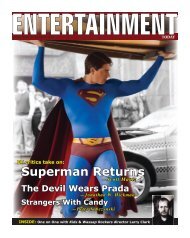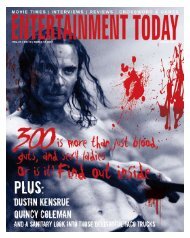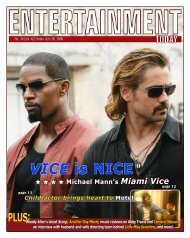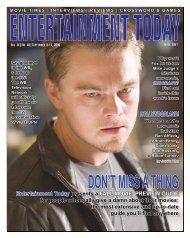LOVE
this issue of Entertainment Today
this issue of Entertainment Today
Create successful ePaper yourself
Turn your PDF publications into a flip-book with our unique Google optimized e-Paper software.
story about a boy in love with baseball and his<br />
struggles to grow up. Consequently, if you don’t<br />
love baseball the way he does, there’s not really<br />
anything offered to you by this film.<br />
Quaint; that’s the best word I can use. It<br />
feels quaint, and not in a good way. While I<br />
don’t demand realism from a children’s film<br />
(nor profound insights), I do expect something<br />
coherent that connects the dots of its various<br />
jokes and skits into a story. Here, all we have is<br />
official turned radio talk show host<br />
G . G o r d o n L i d d y. M e a n w h i l e ,<br />
African-American activist Angela Davis,<br />
novelist Gore Vidal, and former Democratic<br />
Presidential candidate George McGovern<br />
are among the many who tow the film’s party<br />
line.<br />
A point of the documentary (hammered<br />
home by Vidal’s comments) is to also draw<br />
parallels between the era covered in the film and<br />
the present day when an increasingly unpopular<br />
president has this country entrenched in an<br />
increasingly unpopular war. It’s an interesting<br />
and credible (to some, more than others)<br />
observation that draws a line in the sand even<br />
more clearly. Objectivity is not an agenda<br />
never lets the look of the film get in the way of<br />
the other ingredients. While it has necessarily<br />
been slimmed down to fit within the confines<br />
of a two-hour movie, the story is a complex and<br />
twisty flower that smoothly blossoms in front<br />
of the viewers eyes. Even the scenes in the film<br />
that might have stymied other directors—such<br />
as a bit where Bucky finds himself having dinner<br />
with Madeline’s decidedly odd family and<br />
the climax in which everything is more or less<br />
explained in a torrent of exposition—come off<br />
well here because De Palma has found intriguing<br />
ways of approaching them.<br />
The Black Dahlia is a great film, and if it does<br />
anything, I hope that it will remind others just<br />
what a powerful director Brian De Palma can be<br />
when he fires on all cylinders. Although it may<br />
lack the manic invention of such masterworks<br />
as Blow Out or Femme Fatale, the craftsmanship<br />
and attention to narrative detail may come<br />
really a love story. I was surprised to learn that<br />
Al’s wife assists him in his work. She does<br />
research, and keeps files to help him; they are a<br />
team. It is obvious that he loves her and trusts<br />
her deeply. Franken’s other love is clearly his<br />
nation. Gosh, that sounds corny, but he is<br />
shown doing a USO tour and Ann Coulter<br />
is shown making light of the performance. I<br />
thought that his service to his country was<br />
admirable and certainly appropriate for his<br />
talents. One wonders whether Ann would roll<br />
her eyes and sigh audibly if Al had carried a gun<br />
into battle, been injured there, and wanted to<br />
wear his purple heart while denouncing Bush<br />
Administration policy. Perhaps, she would just<br />
label him a “flip-flopper.”<br />
a sloppy mix of historical references and iconic<br />
images, a random collage that never quite gels<br />
into something complete.<br />
And call me a cynic, but in an age when so<br />
many baseball “heroes” are testifying in front<br />
of Congress about the drugs they’re injecting<br />
into their bodies, it might take more than a<br />
comedy about a ball player’s bat to create an<br />
inspiring fairy tale. P<br />
here, but the filmmakers deftly state their case<br />
about the possible cost of being viewed as<br />
“anti-establishment.”<br />
What the film does best, though, is celebrate<br />
the life of one of the most important<br />
and influential artists of the past 50 years (the<br />
soundtrack contains snippets of a whopping<br />
40 Lennon songs). In the accompanying press<br />
notes, Yoko Ono is quoted as saying, “Of all the<br />
documentaries that have been made about John,<br />
this is the one he would have loved,” and it’s<br />
not hard to see why. Not only do the directors<br />
depict him as the personification of righteousness,<br />
they also capture the intelligent, vivacious<br />
spirit that defined the man and his art. P<br />
as a shock to those short-sighted critics and<br />
audiences who have unfairly dismissed him<br />
over the years as a hack who has the visual<br />
skills but who also can’t tell a simple story to<br />
save his life.<br />
Here, he tells a staggeringly complex story<br />
in a straightforward manner that will have even<br />
the most dedicated naysayers grudgingly admit<br />
that the guy can indeed tell a story without any<br />
of his violent, go-for-baroque set-pieces.<br />
In the hands of an ordinary director, The<br />
Black Dahlia might have been an intriguing<br />
film noir fantasy that probably would have<br />
faded from mind fairly quickly. Thanks to De<br />
Palma, the story has been transformed into a<br />
grisly work of art as gruesomely haunting as<br />
the murder it chronicles. P<br />
The saddest thing about the game that<br />
Franken has stepped into is that the only way<br />
to truly succeed, it appears, is to get mean. To<br />
gain an audience, you must provoke and polarize—hence<br />
the use of polarizing language on<br />
the cover of Franken’s book and the assassination<br />
of Franken’s character by his competition.<br />
Still, it’s a game Franken is determined to play,<br />
and he continues to learn how to use what he<br />
calls verbal jujitsu against them. And in all<br />
games, you gotta have lots of heart. God Spoke<br />
shows us that Al Franken’s heart is mighty<br />
big. P<br />
|27|<br />
DVD Review<br />
by Mike Restaino<br />
Jacques Tati’s most formally ambitious<br />
picture (and his most implicitly audiencepolarizing),<br />
Playtime, is the kind of thinkpiece<br />
cinema that will either bore people<br />
shitless or lift the bar on what viewers think<br />
filmmaking has the ability to accomplish.<br />
It makes the picture sound like a boring<br />
museum installation to discuss its aspirations<br />
to fill its frame with as<br />
much swirling data and<br />
gag-related information as<br />
possible—if there’s a story<br />
here, it’s about a man who<br />
comes to a zanily metallic<br />
part of Paris and soaks<br />
it all in—but Playtime’s<br />
notoriety stands tall due<br />
mostly to its sheer density:<br />
There’s always something<br />
happening somewhere<br />
within the diegesis of<br />
Playtime’s inimitable greyon-grey<br />
slipstream.<br />
Yet, this is why even<br />
the best DVD presentation<br />
of the film—which this two-disc<br />
Criterion Collection release is, by all means—<br />
undermines the very merit of the picture. It’s<br />
the oldest and most odious film-snob cliché<br />
of all time: “Films were meant to be seen in<br />
theatres, not on television sets” (at this point,<br />
the bohemian saying this takes a drag off<br />
his clove cigarette and looks away from you<br />
in reproachful disdain). Unless you have a<br />
Here’s the scoop, nerds: Buy now, buy<br />
later.<br />
According to the publicity rhetoric, these<br />
three “original” versions of the beloved Star<br />
Wars films (from 1977, 1980, and 1983,<br />
respectively) are nothing more than bonus<br />
features on the DVD’s that were released<br />
on Tuesday. The craptastic “special edition”<br />
versions of the films get 6.1 EX mixes,<br />
Anamoprhic widescreen transfers, and all<br />
the bells and whistles that the digital versatile<br />
disc can offer. Know this,<br />
though: These new DVDs<br />
do not contain Anamorphic<br />
widescreen transfers of the<br />
original films (if you have<br />
a 16x9 television set, these<br />
babies will not stretch to<br />
their full grandeur).<br />
Why is Fuhrer Lucas<br />
leaving us in the lurch?<br />
Well, there’re a couple of<br />
reasons.<br />
First of all, LucasFilms’<br />
publicity machine likes to<br />
send out press releases that<br />
say things like, “Since these movies do not<br />
represent George’s artistic vision, we could<br />
not put the extraordinary time and resources<br />
into this project as we did with the Special<br />
mammoth boob tube, Playtime will remain<br />
a mesmerizing curio instead of a 65mm<br />
behemoth.<br />
So this DVD re-release of the film is<br />
definitely a far cry from the theatrical experience<br />
of Playtime, but Criterion has given<br />
the picture a pristine new transfer, afforded<br />
it a loving Dolby Surround audio track, and<br />
infused it with a spot-on selected-scene commentary<br />
with film historian<br />
Philip Kemp (one of the<br />
best commentaries I’ve<br />
heard all year), a goofy yet<br />
endearing video introduction<br />
from Terry Jones, as<br />
well as an entire bonus<br />
disc filled with interviews,<br />
documentaries, an audio<br />
excerpt from Tati’s appearance<br />
at Playtime’s 1972 US<br />
debut in San Francisco, and<br />
the unbearably charming<br />
Tati short, Cours du soir<br />
(that was available on the<br />
now out-of-print primary<br />
Criterion DVD release of<br />
the film—throw that disc<br />
into the trash now: This one is better on all<br />
fronts).<br />
In other words, there’s more than enough<br />
here to keep you lovingly occupied while you<br />
regret the puny size of your TV set.<br />
Merde!<br />
Editions” (see www.originaltrilogy.com for<br />
more bombastic tripe).<br />
But more importantly, it has been confirmed<br />
that next year—being the 30 th anniversary<br />
of the first SW picture—will bring the<br />
release of a hunca-munca Star Wars mega set<br />
that will include a ton of stuff that has yet to<br />
be seen by the mass public (biggest rumored<br />
inclusion: Even more “new” footage inserted<br />
into the old prints of the movie—most notoriously,<br />
a scene of Jimmy “Senator Organa”<br />
Smits screaming as Alderaan<br />
is destroyed toward the<br />
middle of film one. And,<br />
no, I’m not joking).<br />
Daddy Lucas wants you<br />
to set your lightsaber down<br />
for twenty minutes, hit up<br />
your local retailer, and pick<br />
up these three new editions<br />
of the films—they’re not<br />
available in one big box for<br />
some reason—and then only<br />
complain a little when you<br />
drop the better part of $200<br />
on the Ultimate Star Wars<br />
DVD collection next Fall.<br />
May the farts be with you, Georgie (and<br />
please don’t be mad, sugar: I ordered my<br />
copies weeks ago). P<br />
SEPTEMBER 15-21, 2006 ENTERTAINMENT TODAY














